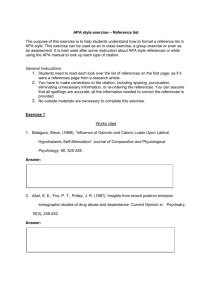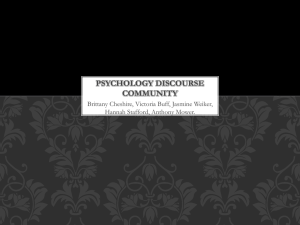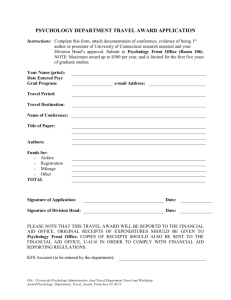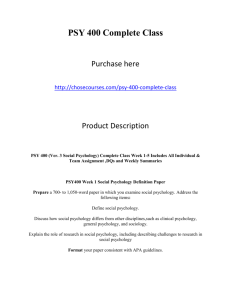Fall 2011 Presidential Newsletter
advertisement
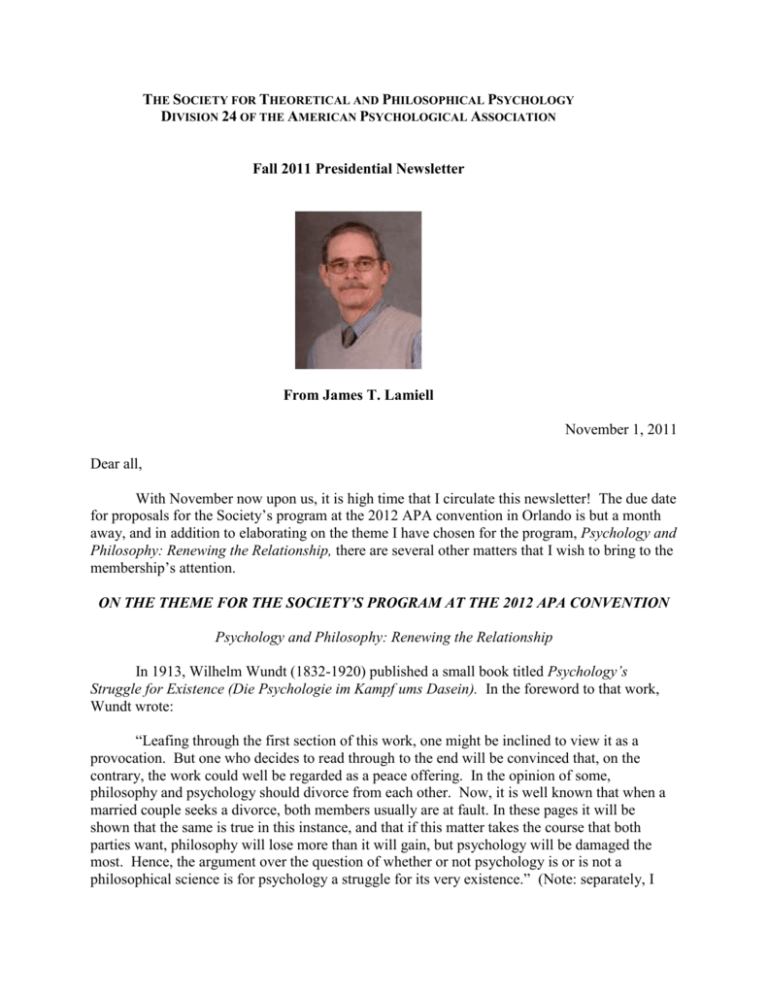
THE SOCIETY FOR THEORETICAL AND PHILOSOPHICAL PSYCHOLOGY DIVISION 24 OF THE AMERICAN PSYCHOLOGICAL ASSOCIATION Fall 2011 Presidential Newsletter From James T. Lamiell November 1, 2011 Dear all, With November now upon us, it is high time that I circulate this newsletter! The due date for proposals for the Society’s program at the 2012 APA convention in Orlando is but a month away, and in addition to elaborating on the theme I have chosen for the program, Psychology and Philosophy: Renewing the Relationship, there are several other matters that I wish to bring to the membership’s attention. ON THE THEME FOR THE SOCIETY’S PROGRAM AT THE 2012 APA CONVENTION Psychology and Philosophy: Renewing the Relationship In 1913, Wilhelm Wundt (1832-1920) published a small book titled Psychology’s Struggle for Existence (Die Psychologie im Kampf ums Dasein). In the foreword to that work, Wundt wrote: “Leafing through the first section of this work, one might be inclined to view it as a provocation. But one who decides to read through to the end will be convinced that, on the contrary, the work could well be regarded as a peace offering. In the opinion of some, philosophy and psychology should divorce from each other. Now, it is well known that when a married couple seeks a divorce, both members usually are at fault. In these pages it will be shown that the same is true in this instance, and that if this matter takes the course that both parties want, philosophy will lose more than it will gain, but psychology will be damaged the most. Hence, the argument over the question of whether or not psychology is or is not a philosophical science is for psychology a struggle for its very existence.” (Note: separately, I have circulated via the Society’s list serve a somewhat expanded version of this text, in which I also provide complete bibliographical information for all works to which I refer in this newsletter.) Wundt’s concern that strong intellectual ties be maintained between philosophy and psychology were not widely shared. Early 20th century psychology proceeded to distance itself ever further from philosophy, so that by the time his countryman and younger colleague William Stern (1871-1938) had settled at Duke University in Durham, North Carolina after fleeing Nazi Germany, he could mention in a letter to his friend and colleague, the Freiburg philosopher Jonas Cohn (1869-1947) a personally satisfying but unexpected and most unusual development. In that letter, which was dated July 16, 1937, Stern wrote: “It will interest you to learn that next year I will also be a member of the Philosophy Department [at Duke]. This is especially pleasing to me because it is customary there for [the psychology and philosophy] departments to be sharply separated.” Now, a century on since Wundt’s dire prediction of the fate of a psychology unconnected to philosophy, a prediction seemingly confirmed by, for example, Michael Gazzaniga’s proclamation of psychology’s death, the time seems propitious for considering the reestablishment of a closer relationship between psychology and philosophy. Questions abound. Traditionally, philosophers have been concerned with matters ontological, epistemological, metaphysical, and ethical. In each of these domains, which is to say throughout philosophy, the quest is for conceptual clarity, and it is here where psychologists might find philosophical discourse – and discourse with philosophers – of considerable theoretical and practical importance. For example: the neuroscientist Maxwell Bennett and the philosopher Peter Hacker have argued that much of contemporary cognitive neuroscience suffers from what they have termed the mereological fallacy, manifested by attributions to parts of persons, such as brains or brain parts -- psychological processes such as judging, deciding, perceiving, choosing, etc., that can properly be attributed only to whole persons. As a second example, significant philosophical issues are also quite central to the scientific program for psychology sketched at the APA meetings in San Diego by Division 24’s 2010 recipient of the Award for Distinguished Theoretical and Philosophical Contributions to Psychology, Rom Harré. Harré has called for the development of psychology as a ‘hybrid’ science, in some of its sub-disciplines well-suited to the concepts and methods of natural science seeking causal explanations for the phenomena of interest, but in others of its sub-disciplines really better regarded as a human science seeking normative explanations for meaningful acts embedded in cultural practices and historical contexts. Clearly, philosophical issues – especially within the province of ethical considerations – are also important in the various arenas of professional psychology, and probing discussions of these matters should also enjoy pride of place in the 2012 program. In addition to the foregoing, some contributors to the program might find occasion to discuss historical and/or contemporary contributions to the literature as especially fitting 2 examples of work that, contrary to the dominant trend of the 20th century (and now into the 21st), did/do remain attentive to philosophical considerations even as a program of rigorous experimental research was/is being prosecuted. The career of former Division 24 President Joseph F. Rychlak is one particularly prominent example of this (e.g., Rychlak, 1988), but there are certainly others worthy of discussion. Finally, some participants might also wish to direct attention to instances where, contra Wundt’s expectations, a program of empirical research in psychology has arguably flourished quite independently of explicit concern for questions of a distinctly philosophical nature. Some might also identify instances where a concern for philosophical questions has arguably impeded progress. In a monograph he published in 1917, for example, William Stern acknowledged that such can happen when philosophers are investigating or commenting critically on psychological work without up-to-date familiarity with the latest findings of such work, a view that has been echoed by at least some contributors to the 2007 Special Issue of the journal Theory and Psychology co-edited by Lisa Osbeck and Michael Tissaw. With all of this in mind, it is my hope and expectation that the theme Psychology and Philosophy: Renewing the Relationship will provide the framework for an exciting and thoughtprovoking program for Society at the 2012 APA convention in Orlando. Proposals must be submitted electronically via the APA website by midnight on Thursday, December 1, 2011. All proposals must be submitted online at http://apacustomout.apa.org/ConvCall. General information on the 2012 Convention can be found at: http://www.apa.org/convention/proposals.aspx and full instructions concerning submissions, submission length, etc. may be found at http://www.apa.org/convention/callprograms-2012.pdf. Please draw this information to the attention of your students, and be sure to inform them of the annual student paper competition, the winner of which is awarded a $200 prize. Students are asked to indicate their status on their proposals so that they can be considered for the award. If you wish further information, please contact the Society’s 2012 convention program chair, Kate Slaney (klslaney@sfu.ca). ON OTHER MATTERS Membership: In my view, the issue most in need of our immediate and sustained attention is that of membership. According to data that I received from APA just one week ago, the Society’s membership has dipped to 333. This is well less than half of the all time membership high of 714 in 1993, and, in fact, is the lowest that the membership has been since Division 24 was founded in 1963. Membership has been declining every year from 2000 to the present. To be sure, division membership has been declining throughout APA. In 1997, total division membership was tallied at 87,437. As of 2010, this number had declined by about 20,000, or about 23%, despite the addition of four new divisions. In our Society, however, membership declined over the same time period by over 40%, from 685 to 401. 3 No less worrisome than our overall numbers are our demographics. Over 80% of our members are male, 80% of us are White, and 73% of us are age 55 or older. Indeed, some 35% of us are age 70 or older! At the APA convention in Washington this past August, Sarah Hickinbottom agreed to assume the post the Society’s Membership Chair, succeeding Jeff Reber, who had served generously and admirably for several years. David Goodman has in turn succeeded Sarah as Early Career Chair. Both of these developments are relevant to the outcome of a discussion that took place in Washington last August, organized by Kate Slaney. That discussion involved a small group of female division members concerned about the challenge we face in attracting young women. One of the outcomes of that discussion was the general agreement that this particular challenge is properly regarded as a part of the larger membership challenge to which I have just pointed. It is not just a matter of attracting more young women into the Society, but more young members, and, indeed, more members, period! In the foreseeable future, we are likely to receive from Sarah, David, Kate, and whomever else might wish to be party to the discussion, some recommendations on specific steps that might be taken to increase our female and early-career membership. Meanwhile, I would like to urge each and every current member to take it upon him/herself to recruit one new member into our Society, at least as an Affiliate if not as a full-fledged member of APA. Obviously, if each one of us were to succeed in this, Division 24 membership would double over the course of a year, bringing it to a level where it has not been since 1998. What a wonderful development that would be! As I think the above-cited demographics make clear, our Society is headed for extinction unless prevailing trends are reversed. Third biennial mid-winter Meeting in Austin, TX: By now, all members should have received the announcement of, and call for papers for, the Society’s third biennial mid-winter conference, scheduled for March 1-3, 2012 in Austin, TX. Alan Tjeltveit has graciously agreed to serve as Program Chair for that meeting, and will be assisted by the other members of the Program Committee, including John Christopher, Kate Slaney, Michael Zhang, and myself. Frank Richardson is also lending lots of on-site help with the logistics in Austin. I hope that we will have a strong turnout in Austin, and look forward to seeing many of you there. Society’s Elder-at-Large: Speaking of Frank Richardson, it was with the unanimous consent of the Executive Committee, under John Christopher’s leadership, that a new position, Elder-atLarge, was proposed during the 2011 mid-winter conference call in February, and then approved at the Executive Committee meeting in August. Frank Richardson is the first individual to be named to this position. The entire Society stands to benefit from Frank’s sage counsel, and it is hoped that we will be able to continue to take advice of the ample professional experience among us as others, in their respective turns, step into the position in the future. Virtual Book Club: Following John Christopher’s lead, the Society will continue to make use of free conference call technology in order to host discussions of works by various members. The next discussion is scheduled for Saturday, November 12, 2011 at 12 P.M. Eastern Standard Time (EST, which goes into effect on Sunday, November 6), and will be led by Thomas Teo, the Editor of the Society’s journal, The Journal of Theoretical and Philosophical Psychology. The 4 focus of the discussion will be on the Thomas’s article “Empirical Race Psychology and the Hermeneutics of Epistemological Violence,” published in 2004 in the journal Human Studies. More detailed information on how to logon to the conference call, will be distributed to the membership in due course via the list serve. Convention Banquet: On John Christopher’s initiative, a dinner gathering of Society attendees at the 2011 APA convention in Washington, DC was arranged. The event proved to be quite successful, attended by some 50 members. It is my hope that a similar gathering can be organized in Orlando. However, this will require the assistance of at least one member who resides in the Orlando area and is both able and willing to check out possible sites for suitability. Some preliminary work can be done via the internet, but, ultimately, it is important that a site visit be made and face-to-face discussions be held with a manager. Accordingly, I would ask anyone able and willing to assume this role to contact me so that we can correspond further about this (see contact information given at the end of this newsletter). It is also hoped that, as was attempted in Washington, the more established members of the Society will donate some money to the cause of defraying the costs to our student members. DIVISION BUSINESS ANNOUNCEMENTS Nominations for Officers: Nominations (including self-nominations) are now being accepted for President-Elect (to succeed Blaine Fowers, who will become President in 2012), SecretaryTreasurer (to succeed Amy Fisher Smith), Member-at-Large (to succeed Michael Tissaw), and Historian/Documentarian (to succeed Alan Tjeltveit). Please email nominations to me at the address given at the end of this newsletter. I should note here that during the business meeting last August, the suggestion was made that the Secretary-Treasurer position be split in two. No formal vote was taken at that time. However, if this is an action we decide to take, then we will need nominations of at least two persons to succeed Amy. I also kindly request that if there are other Executive Committee members who will be stepping down as of next August, those individuals contact me as soon as possible so that I can disseminate that information in a timely fashion. Nominations for Awards: Nominations are also now being accepted for Division 24 Awards: The Award for Distinguished Theoretical and Philosophical Contributions to Psychology, The Sigmund Koch Award for Early Career Contribution to Psychology, The Theodore Sarbin Award, and The Distinguished Service Award. Details regarding awards and former recipients are available on the Division website: http://www.theoreticalpsychology.org/Society_Awards.htm. Please forward nominations to me at the address given at the end of this newsletter. I also draw your attention to the following: in 2007, the Joseph B. Gittler Award was established through a bequest from Dr. Joseph Gittler. The award acknowledges scholarly contributions to the philosophical foundations of psychological knowledge. Self-nominations are welcome. Nomination materials may be submitted online at http://forms.apa.org/apf/grants/, or may be coordinated and collected by the nominator and sent to: 5 APF Joseph B. Gittler Award American Psychological Foundation 750 First Street, NE, Washington, DC 20002-4242. Student Professional Support Fund: The fund was established to help students with expenses related to attendance the APA conventions and other meetings involving the Society. Alas, the membership as a whole has heretofore not been very generous in contributing to this fund. Please know that all donations, however modest, are most welcome, and this is one concrete step that can be taken in support of our collective effort to recruit younger members. Please send any donation you might be able to make to: Dr. Amy Fisher Smith, Department of Psychology, University of Dallas, 1845 E. Northgate Drive, Irving, TX 75062. Update of the Society’s By-laws: In preparing this newsletter, I had occasion to review the Society’s by-laws, and it appears to me that in several places that document is again in need of updating. In due course, I will be suggesting changes/updates that I believe are necessary, doing this in consultation with other members of the Executive Committee, and then bringing the provisional document to the Society’s full membership for considerations in full accordance with the procedures currently stipulated in the present document. Apportionment Ballots: Very soon, you will be receiving an apportionment ballot from APA. This vote determines divisional representation at Council and is key in allotting convention programming time. As always, please consider allocating all your votes to Division 24. I hope to see you in Orlando next August, and I look forward to serving you as President of our Society for the 2011-2012 academic year. It is an honor for which I am grateful, and a responsibility that I do not take lightly. Please feel free to email me with comments, questions, or concerns that you might have. Best wishes, James T. Lamiell Professor and Chair, Department of Psychology Georgetown University Washington, DC 20057 Office telephone: 202-687-3657 Departmental FAX: 202-687-6050 e-mail: lamiellj@georgetown.edu 6
